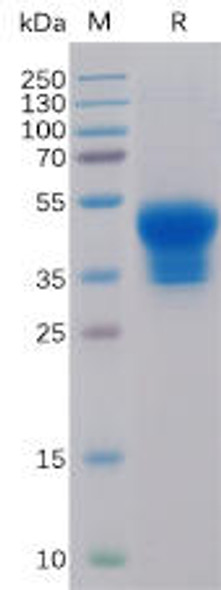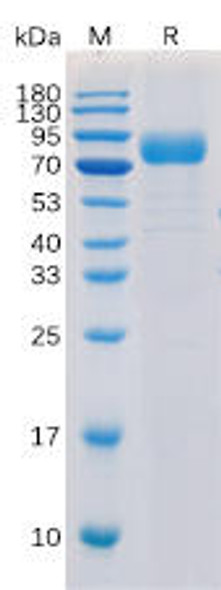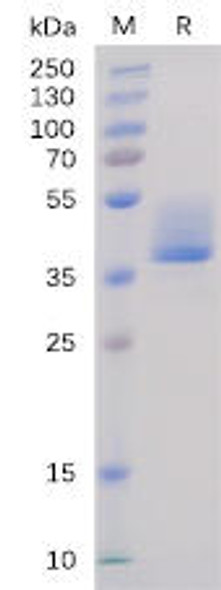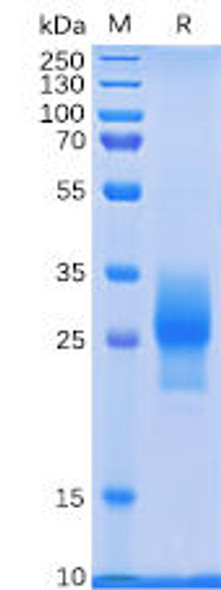recombinant human subcategories
-

Human EGFR Recombinant Protein (His Tag) (HDPT0118)
Immune Checkpoint Recombinant Proteins
Human EGFR Recombinant Protein (His Tag)Description:The protein encoded by this gene is a transmembrane glycoprotein that is a member of the protein kinase superfamily. This protein is a receptor for members of the epidermal growth factor family. EGFR is... -

Human IL2RA Recombinant Protein (His Tag) (HDPT0117)
Immune Checkpoint Recombinant Proteins
Human IL2RA Recombinant Protein (His Tag)Description:The interleukin 2 (IL2) receptor alpha (IL2RA) and beta (IL2RB) chains, together with the common gamma chain (IL2RG), constitute the high-affinity IL2 receptor. Homodimeric alpha chains (IL2RA) result... -

Human ROR2 Recombinant Protein (His Tag) (HDPT0116)
Immune Checkpoint Recombinant Proteins
Human ROR2 Recombinant Protein (His Tag)Description:The protein encoded by this gene is a receptor protein tyrosine kinase and type I transmembrane protein that belongs to the ROR subfamily of cell surface receptors. The protein may be involved in the... -

Human CLEC12A Recombinant Protein (His Tag) (HDPT0115)
Immune Checkpoint Recombinant Proteins
Human CLEC12A Recombinant Protein (His Tag)Description:This gene encodes a member of the C-type lectin/C-type lectin-like domain (CTL/CTLD) superfamily. Members of this family share a common protein fold and have diverse functions, such as cell adhesion,... -

Human Her2 Recombinant Protein (His Tag) (HDPT0114)
Immune Checkpoint Recombinant Proteins
Human Her2 Recombinant Protein (His Tag)Description:This gene encodes a member of the epidermal growth factor (EGF) receptor family of receptor tyrosine kinases. This protein has no ligand binding domain of its own and therefore cannot bind growth... -

Human TACI Recombinant Protein (hFc Tag) (HDPT0113)
Immune Checkpoint Recombinant Proteins
Human TACI Recombinant Protein (hFc Tag)Description:The protein encoded by this gene is a lymphocyte-specific member of the tumor necrosis factor (TNF) receptor superfamily. It interacts with calcium-modulator and cyclophilin ligand (CAML). The protein... -

Human CD52 Recombinant Protein (mFc Tag) (HDPT0112)
Immune Checkpoint Recombinant Proteins
Human CD52 Recombinant Protein (mFc Tag)Description:CD52 (CD52 Molecule) is a Protein Coding gene. Diseases associated with CD52 include Prolymphocytic Leukemia and Lymphocytic Leukemia. Among its related pathways are Metabolism of... -

Human CD19 Recombinant Protein (hFc-His Tag) (HDPT0111)
Immune Checkpoint Recombinant Proteins
Human CD19 Recombinant Protein (hFc-His Tag)Description:Lymphocytes proliferate and differentiate in response to various concentrations of different antigens. The ability of the B cell to respond in a specific, yet sensitive manner to the various... -

Human TIGIT Recombinant Protein (His Tag) (HDPT0110)
Immune Checkpoint Recombinant Proteins
Human TIGIT Recombinant Protein (His Tag)Description:This gene encodes a member of the PVR (poliovirus receptor) family of immunoglobin proteins. The product of this gene is expressed on several classes of T cells including follicular B helper T cells... -

Human TIGIT Recombinant Protein (mFc Tag) (HDPT0109)
Immune Checkpoint Recombinant Proteins
Human TIGIT Recombinant Protein (mFc Tag)Description:This gene encodes a member of the PVR (poliovirus receptor) family of immunoglobin proteins. The product of this gene is expressed on several classes of T cells including follicular B helper T cells... -

Human BAFF-R Recombinant Protein (hFc Tag) (HDPT0107)
Immune Checkpoint Recombinant Proteins
Human BAFF-R Recombinant Protein (hFc Tag)Description:B cell-activating factor (BAFF) enhances B-cell survival in vitro and is a regulator of the peripheral B-cell population. Overexpression of Baff in mice results in mature B-cell hyperplasia and... -

Human 4-1BB Recombinant Protein (His Tag) (HDPT0106)
Immune Checkpoint Recombinant Proteins
Human 4-1BB Recombinant Protein (His Tag)Description:The protein encoded by this gene is a member of the TNF-receptor superfamily. This receptor contributes to the clonal expansion, survival, and development of T cells. It can also induce proliferation...
